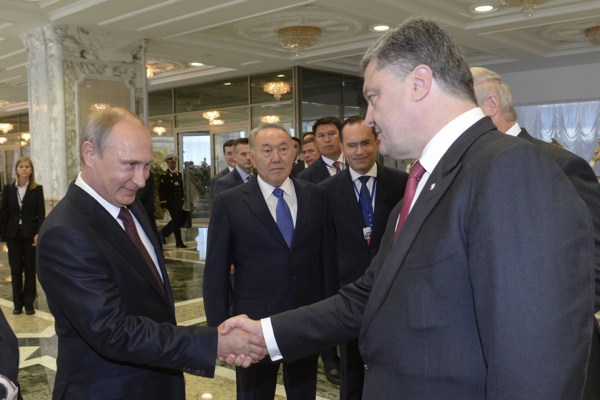Russian President Vladimir Putin is scheduled to meet with Ukrainian President Petro Poroshenko and the leaders of Italy, France, Germany, the United Kingdom and other European countries at tomorrow’s 10th Asia-Europe Meeting (ASEM) in Milan. The meeting, the third between Putin and Poroshenko since the latter took office in May, will include talks on Russia’s supply of gas to European countries via pipelines through Ukraine, which was a fraught issue even long before the ouster of Ukraine’s previous president, Viktor Yanukovych, in February. Russia shut off Ukraine’s gas supply in June, citing Ukraine’s failure to pay its debts, and the issue has taken on a new urgency as temperatures drop. A European Commission report released today noted that several European Union members, including Bulgaria, Finland and Estonia, are particularly vulnerable to a potential gas cutoff.
Hopes are high that by resolving their energy dispute, Russia and Ukraine can also resolve the nearly yearlong crisis that has killed over 3,500 people, including the 298 people on Malaysian Airlines Flight MH17, in eastern Ukraine. While a first attempt at a cease-fire on Sept. 5 sputtered, a second agreement reached in Minsk on Sept. 20, which called for heavy artillery to be withdrawn from the front line and for the establishment of a buffer zone between government and separatist forces, appears to be mostly holding. Over the weekend, Putin ordered thousands of troops to pull back from their positions on the Ukrainian border, easing fears of a large-scale Russian invasion.
But Russian-backed separatist forces remain in control of a significant part of eastern Ukraine, and clashes have continued in and around the city of Donetsk. Meanwhile, in Crimea, which Russia annexed from Ukraine in March, Moscow has begun organizing a census as part of the consolidation of its control there, which few expect to be reversed. Even Alexey Navalny, Russia’s leading opposition figure, said this week that he would not support returning Crimea, a position shared by most Russians.

